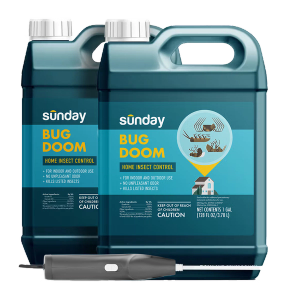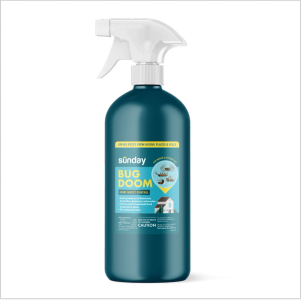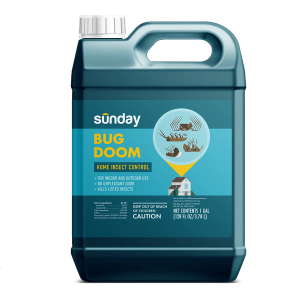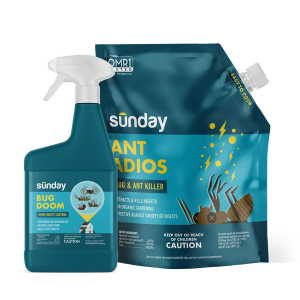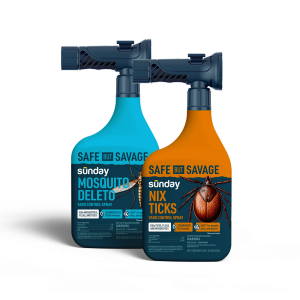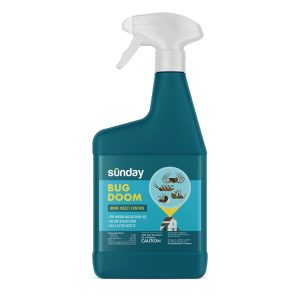How to ID mosquitoes
It’s easy to tell a mosquito apart from a crane fly or a non-biting midge when they’re feasting on your arm, but how can you really tell a mosquito is a mosquito? First of all, crane flies are quite a bit larger than mosquitoes and non-biting midges usually have very fuzzy antennae. You can also listen for soft buzzing or humming as a small and delicate fly-like bug approaches. Then look for a long needle-like mouthpart looking to actively feed. But hopefully, this ID doesn’t result in one of those painful and itchy red welts they tend to leave.
What are the most common mosquitoes in the US?
Two of the most common mosquitoes in the U.S. are the Northern house mosquito (Culex pipiens) and the Asian tiger mosquito (Aedes albopictus). Northern house mosquitoes are less than 1/2 inch long and brown. Asian tiger mosquitoes are 1/2 inch long and have black and white stripes on the body. Why do these particular species matter? These are the most common mosquitoes you’ll find biting your skin and they’re located nationwide—essentially present and active in every region of the U.S. Plus, these are the mosquitoes you’ll likely be managing with the IPM strategies below and Sunday’s Mosquito Deleto.
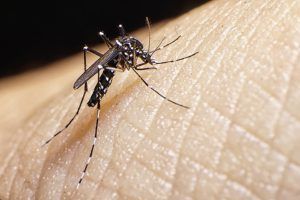
Where do mosquitoes live?
Although the stray mosquito might work its way into the house, mosquitoes are most common outdoors in yards and gardens across the U.S. Mosquitoes reproduce by laying eggs in or on water. You may notice small wriggling creatures in water that has been left out—those are mosquito larvae. Some need large pools of standing water, while others can breed in as little water as is found in a soda bottle cap. Most mosquitoes won’t venture more than a mile or two from their breeding sites, though some can travel several miles.
When are mosquitoes active?
Well, it depends. Northern house mosquitoes will start biting when temps hit 61° F and these lil’ vampires are most hungry at dawn and dusk. Asian tiger mosquitoes start developing at 50° F; once they mature, they like to snack (on you) all throughout the day.
Mosquito-proof your backyard
The best way to prevent a heavy mosquito outbreak is to prevent successful mosquito growth and reproduction. Here’s how:
- Dump any standing water around the yard to prevent adults from laying eggs, and to remove any existing eggs and larvae. Refresh your bird bath regularly and check flower pots, gutters, tarps, rain barrels, drain extenders, and toys for stagnant water.
- Keep water in fountains or ponds moving, or add wildlife (tadpoles, fish, etc.) to deter mosquitoes from breeding in calm water.
- Keep your grass mowed and trim up any landscape plants to reduce shade and moisture.
- Irrigate your lawn properly to avoid standing water.
- Break out the fans for outdoor events! Mosquitoes can’t fight the wind, so if you’re having a party, placing some fans around the party zone can help keep mosquitoes away from your guests.
- If mosquitoes are still "bugging" you, try planting some mosquito-repelling plants around heavily used areas of the yard.
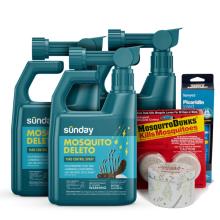
Mosquito Control Pest Plan - Medium
- Mosquito Deleto kills mosquitoes on contact and repels for up to 4 weeks
- Skin repellent prevents bites
- Mosquito dunks treat larvae in standing water and gutters for up to 30 days
- Citronella candle with hints of cedarwood and lemongrass burns for up to 40 hours
- Total plan offers between 4-6 months of protection
The Sunday way to a mosquito-free yard
Sunday’s Mosquito Deleto uses cedarwood and lemongrass oils for a natural approach to mosquito control. Here’s how to use it:
- Always read and follow label instructions.
- Decide where you want your "protected zone" to be—this is where you and your family spend the most time. Think patios, play areas, and outdoor dining spots.
- Spray shaded and damp areas where mosquitoes hang out, along with your protected zone.
- If your mosquito problem is really intense, spray again seven days after your first treatment.
- Apply every 14 days if you live in a cloudy, mild, or wet region, or every 28 days if you’re in a sunnier or dryer climate.
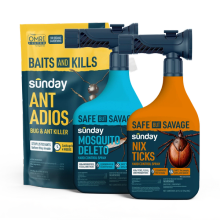
Mosquito + Tick + Ant Pest Control Pack
- Protects your yard from unwanted insects like mosquitoes, ticks, fleas, ants, and more!
- Kills mosquitoes, ticks, and fleas on contact, prevents for up to 4 weeks
- Collapses ant mounds in 3-14 days
- Perfect for northeast and midwest homes
Cited sources
Mosquitoes. Utah State University.
Mosquitoes in and around the Home. Purdue University Extension.







